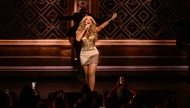Black Mountain Institute’s Emerging Writers Series gives Las Vegans a chance to get to know big names just before they hit their tipping point. Manuel Gonzales is there, from his short story collection, The Miniature Wife, to his forthcoming novel, The Regional Office Is Under Attack! Formerly a pie-shop owner and director of the Austin Bat Cave, a nonprofit writing center for children, Gonzalez captures fantastical creatures like zombies, werewolves and unicorns in everyday scenarios.
Some of your work relies on elements of fantasy, but set in our mundane reality. What inspired you to, say, put a love-struck zombie in a cubicle? Most of my stories in this collection came out of a “what if?” moment. I’d been flying a lot for work and after a while began to feel like I lived on an airplane, and then thought, “Oh, what if I did live on an airplane; what would that be like?” My daughter got a unicorn toy from McDonald’s on a road trip and wanted to rename it because she didn’t like the name it was given, and I thought, “Oh, what would I name a unicorn if I had one (Sabre Bitch was my first thought),” and that led to, “Oh, what if I had a unicorn,” and then, “Oh, what if my best friend had a unicorn?” The zombie story began in the same way, except the “what if” was, “What if the zombie got to tell his own story; what would that be like?” And because I’ve been love-struck and more often than not, that love was an unrequited love, then so is the zombie’s love. A lot of what I play around with, though, when pairing mundane reality with elements of fantasy, is this idea that fantastical things will make life better. I don’t know that they would make life better, and I think more often than not, they would make life worse, or at least more complicated, when life seems complicated enough as it is.
You also toy with divisions between fiction and nonfiction. Why? I find the distinction between fiction and nonfiction kind of blurry and fascinating because of that blur. As a fiction writer, my job is to create these elaborate lies that somehow get to some deep kernel of truth, but there are all these hoops I have to jump through—I have to create believable characters and realistic situations, or if the situations aren’t realistic, I have to make them seem realistic. But nonfiction, I mean, no hoops! That’s not true, of course. Nonfiction has its own slew of hoops to jump through, one of which being that the story’s details need to be true, or close to true. But I love how, in nonfiction, you can get away with tons more exposition, and how the tone and language allow you to sidestep any number of other “rules” in the world of fiction. It’s fun, too, to see what kind of outlandish story can be made more palatable and believable when coupled with a reportorial tone, a nod to facts-based writing and research.
What does your novel have in store for us? My novel, due out next year, plays around with the thriller and the secret agency tropes. One of the main characters is a woman with a mechanical arm, but one designed to look just like her normal arm, and so there’s some question as to whether she has a mechanical arm. The Regional Office trains at-risk but uniquely powered young women to battle the encroaching forces of darkness, and then one day it’s under attack, and it follows some of the more peripheral characters in that scenario. It’s been a lot of fun to write, and I can’t wait for it to come out.
Manuel Gonzales reading February 19, 7 p.m., free. UNLV’s Greenspun Hall Auditorium, 702-895-5542.







